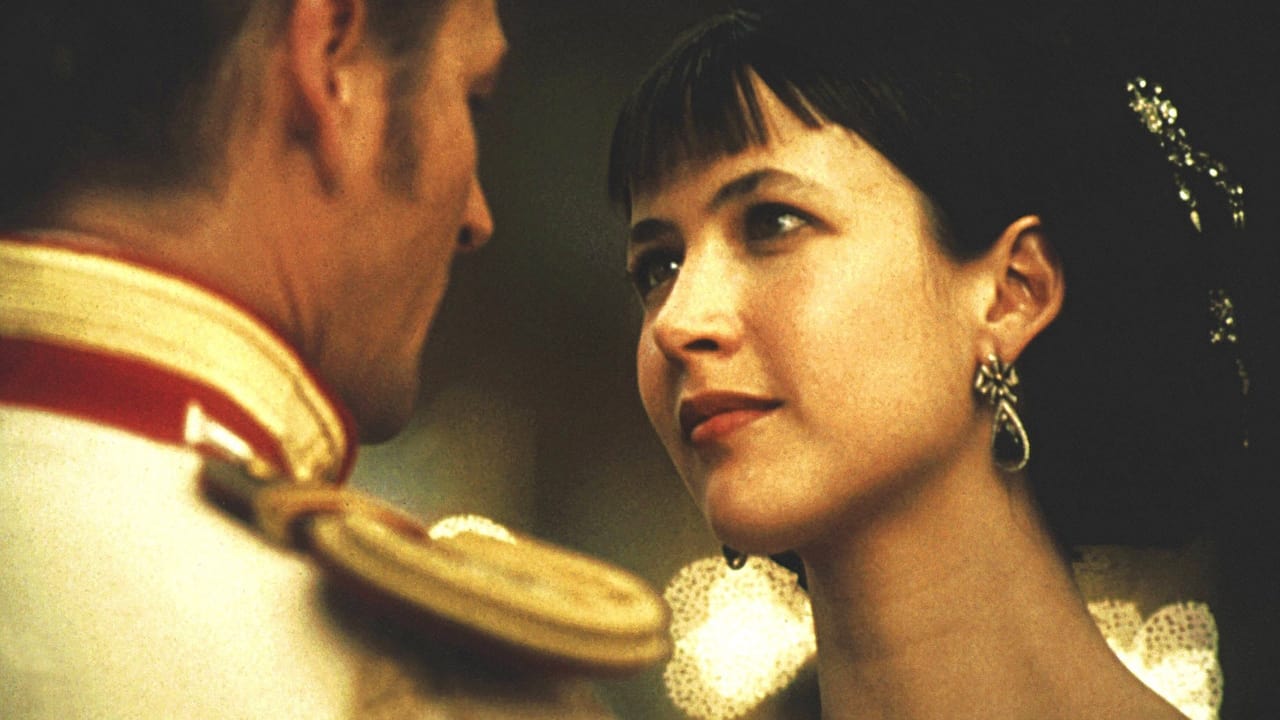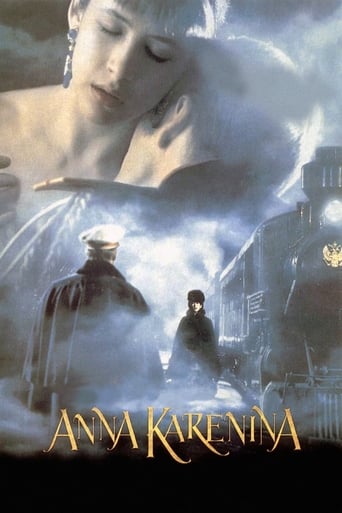

THIS IS THE FIRST TIME I SAW WHO SEAN BEAN WAS. I WAS TOTALLY IN LOVE WITH HIM IN THIS FILM AND THE DANCE SCENE IN BALLROOM. I WANTED THEM TO GO ON FOREVER. I JUST DIDN'T UNDERSTAND WHY THEY PICKED AN ACTRESS WITH THOSE SILLY BANGS. ALTHOUGH I THOUGHT SHE PLAYED THE PART WELL. AS FOR SEAN..................BE STILL MY HEART.
... View MoreThough not a faithful adaptation like any other until now, it's a very decent and well done with no doubt. Sophie Marceau played Anna beautifully and Sean Bean was very good as Vronsky. The only versions I watched about Leo Tolstoy's novel are this and the 2012 one, which I consider a gorgeous adaptation, despite the critics and public review, and also refreshing and interesting which it's what I admire from an new adaptation.This adaptation retains most of the Russian feeling and atmosphere, being filmed there, and also including some Russian dialog from time to time. It's something that inspires a lot of respect indeed, but that doesn't mean we should criticize the other adaptations for being filmed in Britain or America or, the most common complain nowadays, for having British accents.This one has British accents too, but because there are more well-known actors/actress appreciated by the public and most important because it was filmed in Russia with some mild Russian dialog, some parts for which other adaptations suffer has been overlooked here. I, as a viewer and a fan of movies, never ever paid attention that much to accents. If that's a good thing or not, it's up to every persons personal view, but for me it's a very silly and childish thing to judge a movie and the actors performances 70% based on what accents they perform. This brings in my view the theory that people get very bored in this life lately and prefer to pick up on silly matters in every aspect of his life. This only will downfall this world. One should learn to appreciate simple things more and pay attention to what matters.I recommend this one, for being a very decent adaptation, not all faithful but it doesn't matter in my opinion.The performances were great, the actors did a superb job, and Russia looks stunning. But I also recommend the 2012 version too. They are both brilliant in their own way, but warning: tell them apart and don't compare them. They are different. For me Keira was a perfect Anna Karenina. Sophie did a wonderful job too, but I love Keira more and so does my mother, who loves the book and this version, but admires the new one too.8/10
... View MoreI felt compelled to create an IMDb account and write this review after reading some of the negative reviews that exist for this movie. First of all, let me say that this movie is underrated on IMDb. It should have a rating of at least a 7.0. At the time of this review, this movie has a lower rating than Star Wars I Phantom Menace. Come on people, that's an outrage! I feel an 8.0 is a solid and reasonable rating when you compare this film to most of the movies that are overrated on this site. Now to the bulk of the review.First of all, I think most people would agree that the film is visually stunning. Everything from the costumes, to the landscapes, to the buildings, all of it is eye candy. While this is only one aspect of the film, I think it is an important one because the visuals help set the right tone and romantic atmosphere that is found in the novel. The visuals themselves are enough reason to see this film, even if you know nothing about the story or don't care for it.Secondly, the performances by Sophie Marceau, Sean Bean, and the rest of the cast were superb. There was only one major issue with the acting in my opinion.I wasn't fond of how Stepan (Stiva) was portrayed in the movie. The actor who played him was too dull and flat. In the novel, Stepan is supposed to be charming and sort of opposite to Levin in personality. Other than that, I found everyone to be excellent in their roles. Contrary to what you may think after reading some of the negative reviews, Sophie Marceau was a wonderful Anna. As a previous review stated, I think her French accent was positive and enhanced her performance. After all, in the novel it says that Anna and Vronsky spoke French with each other most of the time. Secondly, I found that both her and Sean Bean made the affair between Anna and Vronsky credible, believable, and every bit dramatic as it is in the novel. Some have complained that Sophie did not capture Anna's simplicity or elegance, but this is just outright wrong. Sean Bean, despite not having the mustache, played Vronsky well. As a guy, I generally hate love scenes in films because the lines are so cheesy and the actors/actresses have no chemistry. While some of the things Vronsky says in the movie/and the novel may seem cheesy and overly dramatic, Sean Bean's delivery is perfect and not overly done. On the whole, Sophie Marceau and Sean Bean had great chemistry in this film. Alfred Molina and Mia Kirshner were great as Levin and Kitty, although I thought her accent was a little weird and out of place.Lastly, the director did a really good job of selecting appropriate scenes and making them fit together to do justice to the novel. As with any other film based off a long novel, much had to be cut out. However, all the important scenes that compromise the essence of the many themes in the novel were all present. With that being said, the movie still had its flaws. For example, I did not like the few narrations that were placed in the film and thought they were unnecessary and detracted from the film's flow. Maybe this is because I watched the film right after finishing the book for the second time, so the plot was fresh in my head. The film also had a few oddball scenes that were not done well, such as in the beginning with the conversation between Dolly and Anna. For me, this whole scene seemed wrong because of how they changed Anna's lines. However, on the whole most of the scenes were not only faithful to the novel, but due to the wonderful visuals and performances, brought it to life.On the whole, I wasn't expecting much from this film. I thought it was going to be a crummy "Hollywood" version of one of my favorite novels and wasn't expecting much from Sophie Marceau or Sean Bean. While there were some of these "Hollywood" style elements, ( just look at the waltz they had in the movie) the movie overall was surprisingly refreshing and well done. Definitely worth seeing.
... View MoreIn general I liked this movie very much. It has a very authentic atmosphere and is the only movie version of "Anna Karenina" that actually follows the point of view of the book. The setting is amazing and the costumes are brilliant. The actors are great: Karenin - James Fox is amazing. I've always had a weak spot for Sean Bean as well and I think (although in his usual roles he is more of a rogue) he carries off the part of the count rather well. When I said the actors are great however, that does not stretch to Marceau. She's just not good as Anna Karenina. And, more important, the relationship between Wronsky and Anna does not work - I don't know, but the acting between those two could not have been worse if the actors actually despised each other. And the relationship has no development. The audience does not even get an idea what their relationship is about - there is no tension between them. Anna Karenina seems to be more hysterical than anything else. To Summarize: Yes, this movie is worth seeing. It is a wonderful story, told in a great setting with a lot of good actors. Just ignore the performance of Marceau.
... View More